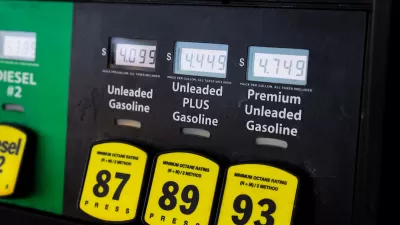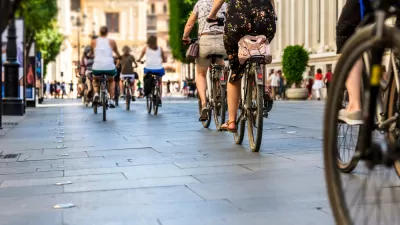In this second and final look at how to achieve Republican presidential candidate Newt Gingrich's promise of $2.50 gas, Marketplace's Kai Ryssdal reports on a subsidy strategy discussed in The Atlantic. Earlier he presented a price controls approach.
"The Atlantic magazine took another track: $187 billion a year in government subsidies" from the one presented by Marketplace's Sustainability Desk on Feb. 27.
Jordan Weissmann, an associate editor at The Atlantic, determined that $2.50 gallon gas could be achieved with $187 billion in federal subsidies. Of course, that would conflict with Newt's goal of a smaller government, as would the price controls of the Nixon era suggested by Economist Paul Sullivan at the National Defense University in Marketplace's earlier Sustainability Report. (Podcast available).
However, that does not deter the candidate.
"If you would like to have a national American energy policy, never again bow to a Saudi king and pay $2.50 a gallon, Newt Gingrich will be your candidate," he said to cheers (in Burlingame, CA on Feb. 24).
However, Rep. Henry Waxman (D-Calif.) reminded the House Energy and Commerce Committee on March 6 that "even if we produce as much as we consume, we'd still have to pay the world market price for crude."
From AP via ABC News: Congress Debates Rise in Gas Prices _ Again: "Waxman and other Democrats said the best way to combat rising oil prices was to reduce U.S. dependence on oil. "There's no silver bullet," he said.
FULL STORY: Want $2.50 a gallon gas? Try $187 billion in subsidies

Planetizen Federal Action Tracker
A weekly monitor of how Trump’s orders and actions are impacting planners and planning in America.

Maui's Vacation Rental Debate Turns Ugly
Verbal attacks, misinformation campaigns and fistfights plague a high-stakes debate to convert thousands of vacation rentals into long-term housing.

San Francisco Suspends Traffic Calming Amidst Record Deaths
Citing “a challenging fiscal landscape,” the city will cease the program on the heels of 42 traffic deaths, including 24 pedestrians.

Amtrak Rolls Out New Orleans to Alabama “Mardi Gras” Train
The new service will operate morning and evening departures between Mobile and New Orleans.

The Subversive Car-Free Guide to Trump's Great American Road Trip
Car-free ways to access Chicagoland’s best tourist attractions.

San Antonio and Austin are Fusing Into one Massive Megaregion
The region spanning the two central Texas cities is growing fast, posing challenges for local infrastructure and water supplies.
Urban Design for Planners 1: Software Tools
This six-course series explores essential urban design concepts using open source software and equips planners with the tools they need to participate fully in the urban design process.
Planning for Universal Design
Learn the tools for implementing Universal Design in planning regulations.
Heyer Gruel & Associates PA
JM Goldson LLC
Custer County Colorado
City of Camden Redevelopment Agency
City of Astoria
Transportation Research & Education Center (TREC) at Portland State University
Jefferson Parish Government
Camden Redevelopment Agency
City of Claremont





























